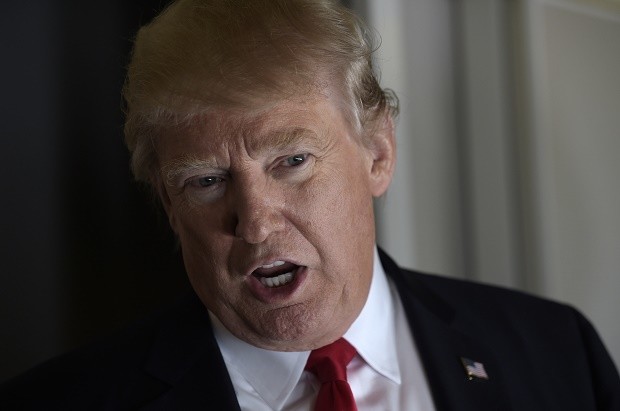 President Donald Trump speaks to reporters on Air Force One while traveling to Palm Beach International Airport in West Palm Beach, Fla., Friday, Feb. 3, 2017. Trump is spending the weekend at Mar-a-Lago. AP
President Donald Trump speaks to reporters on Air Force One while traveling to Palm Beach International Airport in West Palm Beach, Fla., Friday, Feb. 3, 2017. Trump is spending the weekend at Mar-a-Lago. AP
NEW YORK — President Donald Trump’s heated rush to launch what he said would be a “major investigation” into voter fraud has cooled, leaving White House staff uncertain when it will come to pass or what shape it will take.
An executive action commissioning the probe is still planned but could be several weeks away, two senior administration officials said Friday. Although Trump instructed staff to jump on the project last week, he has not discussed the issue in recent days, according to two other people in close touch with the president. All demanded anonymity to discuss private conservations.
Asked about the status of the effort, White House spokeswoman Lindsay Walters said: “I do not have an update at this time.”
The indefinite delay comes as some of Trump’s advisers counseled him to abandon the idea, arguing it was a distraction from more pressing issues. There is no evidence of widespread voter fraud in last November’s election. Trump won the Electoral College vote but lost the popular vote by nearly 2.9 million votes to Democrat Hillary Clinton.
The episode is a striking example of the new president’s mercurial streak and his willingness to impulsively seize on ideas with little planning and sometimes later reverse course when encountering obstacles or criticism.
A senior official said the investigation, which Trump never publicly discussed in detail, has become less of a priority because it has been drowned out by other White House efforts, including attempts to manage the chaotic aftermath of Trump’s executive order restricting immigration from seven Muslim-majority nations. The investigation likely would not considered until well after the confirmation of Trump’s pick for attorney general, Republican Sen. Jeff Sessions of Alabama, the official said.
That would be a marked change from the breakneck pace by which the order was first introduced.
In his earliest days in office, Trump appeared to be fixated on the election results and frustrated by political opponents who questioned the legitimacy of his victory.
At his first meeting with bipartisan lawmakers, he declared believed that 3 million to 5 million people voted illegally in November, a widely debunked assertion that sent the White House scrambling to craft an order that met the president’s wishes.
Two days later, Trump announced in a pair of tweets that a “major investigation” will look at those registered to vote in more than one state, “those who are illegal and … even, those registered to vote who are dead (and many for a long time).” Depending on results, the Republican tweeted on his sixth day in office, “we will strengthen up voting procedures!”
Several congressional Republicans decried the claim as a distraction, other executive orders were rescheduled and an administration set to roll out an ambitious first-week agenda found itself suddenly sidetracked.
White House staffers told reporters on the afternoon of Jan. 26 to get ready, that it was nearly time to be escorted into the Oval Office to witness Trump sign the order. But the photo-op was abruptly postponed. And now, though more than a week has passed, it has yet to be rescheduled with no timetable announced for its return.
The White House also abruptly canceled an executive action on cybersecurity this week, after briefing reporters on its text and putting the signing ceremony on the president’s public schedule. That action has not yet been signed.
Trump’s call for a probe alarmed Democrats who already believe that efforts to tighten voter ID laws are a means to restrict access to the ballot box. And soon members of Trump’s own party suggested it was misguided.
House Oversight Committee Chairman Jason Chaffetz, a Utah Republican, broke with Trump, saying he sees no evidence of voter fraud in the 2016 election and says his committee won’t investigate it. He said Trump is free to order the Justice Department to investigate the issue, but that he was not interested in launching a congressional inquiry.
Trump’s own attorneys dismissed claims of voter fraud in a legal filing late last year responding to Green Party candidate Jill Stein’s demand for a recount in Michigan, a state Trump won. Referring to that outcome, the attorneys wrote: “All available evidence suggests that the 2016 general election was not tainted by fraud or mistake.”
White House press secretary Sean Spicer said last week that a task force could be commissioned to focus on dead people who remained on voter rolls and people registered in two or more states. And he said it could center on “bigger” states where Trump didn’t compete during the campaign, singling out California and New York, two Democratic strongholds.
No details have been released about the possible probe, including who would oversee it. One possibility would be Sessions, who has shown sympathy toward claims of voting fraud. He will likely face a Senate confirmation vote next week. The president himself can’t order a criminal investigation.






